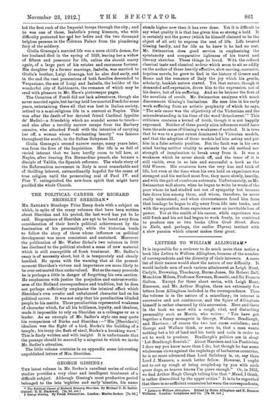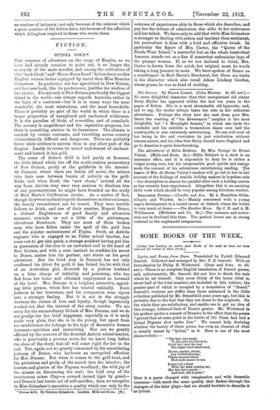LETTERS TO WILLIAM ALLINGHAM.*
IT is impossible for a reviewer to do much more than notice a book like Letters to William Allingham, because of the number of correspondents and the diversity of their interests. A mere list of their names would show the nature of our difficulty. It would include men of such various attainment as Leigh Hunt, Carlyle, Browning, Thackezay, Burke-Jones, Sir Robert Ball, Monckton Milnes, Professor Newman, Rossetti, and Sir Francis Galton. Except for three short series, with Leigh Hunt, Emerson, and Mr. Arthur Hughes, there are extremely few letters from Allingham included in the correspondence. Thus the volume is in the nature of a miscellany; its interest is successive and not continuous, and the figure of Allingham himself is rather obscured by this succession. Here and there in the book we meet with a rough, vital, and disturbing personality such as Morris, who writes : " You have got together a funny menagerie in George, Wallace, Bradlaugh, and Harrison : of course the two last curse socialism ; and George and Wallace think, or seem to, that a man wants nothing but a bit of land and his teeth and nails in order to set to work to produce. Bradlaugh's politics are in short Let Bradlaugh flourish !' About Harrison and his Positivism I dare say you know more than I do; but though he has some wholesome views against the exploitage of barbarous countries, he is no more advanced than Lord Salisbury is, or, say than Lord J. Manners, a much better fellow. However, I ought not to cut up rough at being coupled-up by you with such queer dogs, as heaven knows I'm queer enough." Or, in 1855, we find Arthur Hugh Clough telling him that "Maud, I think, is rather discredited by the upper critics." It is to be regretted that there is no sufficient connexion between the correspondents, • Letters to William Allingham. Edited by Helen Allingham and E. Banmer Williams. London: Longman and Co. [7s. ed. net.]
ma nucleus of intimacy; not only because of the interest whitab a great number of the letters have, but because of the affection which .Allingham inspired in those who wrote them.















































 Previous page
Previous page